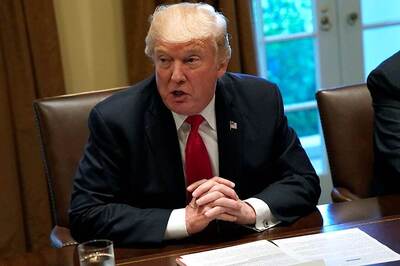
views
Ramallah, West Bank: In a direct challenge to the United States, the Palestinians said on Thursday they will ask the Security Council next week to accept them as a full member of the United Nations, even though Washington has promised to veto the measure.
The Palestinian assertion came as a senior US diplomatic team was in the region trying to avert an embarrassing showdown and relaunch peace talks. By pushing forward, the Palestinians risk putting President Barack Obama in the uneasy position of having to veto a measure supported by the vast majority of the international community.
Foreign Minister Riad Malki told foreign journalists the Palestinians were not looking for a fight. But he said the American stance puts the US in a "confrontational position" with the rest of the world, and suggested American credibility could be at stake.
"I don't know what it means to the standing of the US in the United Nations and among the countries of the world," he said.
Even so, the Palestinians left the door open for compromise.
Malki said the Palestinians were still ready to listen to suggestions from American envoys. And in New York, his UN ambassador, Riyad Mansour, said a final decision on whether to pursue recognition in the Security Council, or seek a lesser, symbolic status in the General Assembly had not yet been made.
"The final decision will be taken in the next few days as to which path we will follow," Mansour said.
Asked about his boss's comments in Ramallah, he replied: "There are many words from many places, but what I'm telling you is that we are deliberating all these details and it is not yet finalized." Palestinian President Mahmoud Abbas was to give a speech on Friday in Ramallah and there was speculation he might address the issue then.
In Washington, White House spokesman Jay Carney emphasized that negotiation with Israel was the only viable path to Palestinian statehood.
"The Palestinians will not and cannot achieve statehood through a declaration at the United Nations. It is a distraction, and in fact, it's counterproductive," he said, adding that "the only way to resolve the issues between the Palestinians and the Israelis, and to ultimately create a Palestinian state, is through direct negotiations."
The Palestinians seek an independent state in the West Bank and Gaza Strip, with east Jerusalem as their capital. Israel captured the territories in the 1967 Mideast war.
Israeli Prime Minister Benjamin Netanyahu rejects a complete pullout from the West Bank and says Israel must retain east Jerusalem, which it considers an inseparable part of its capital. Israel withdrew from Gaza in 2005.
The Palestinians say they are turning to the UN in frustration after years of failed peace talks. While a UN vote will not change the situation on the ground, the Palestinians believe it will improve their position in future talks. In particular, they say Israel must accept the 1967 borders as the basis of a future agreement.
By doing so, Malki argued Israel could help end its growing international isolation. Israel's relations with key regional allies Egypt, Turkey and Jordan have all grown rocky in recent months.
"I think the best way out for Israel today is to come forward and to recognize the state of Palestine on the '67 borders," Malki said.
Obama himself has endorsed the 1967 lines as the basis for a settlement. But he, like Israel, says a peace agreement can be reached only through negotiations.
Both the US and Israel fear a UN vote could lead to violence and other negative consequences. The Palestinians already are planning two mass demonstrations in the West Bank next week, though they insist the marches will be peaceful.
Israel has other concerns as well. It fears the Palestinians, with an upgraded status at the UN, could join various international bodies and pursue action against the Jewish state. One of the biggest fears is that the Palestinians could join the International Criminal Court, a special body set up to prosecute war crimes.
While it remains unclear whether the Palestinians could actually join the court, Malki threatened that if accepted, the Palestinians could try to open proceedings against Israel at the ICC.
"There will be no reason for us to go to the ICC if Israel does not take any action that's considered to be illegal, or a crime against humanity," he said. "If Israel takes such an action, we might find ourselves compelled."
Malki said Abbas would personally submit the Palestinian request for membership to UN Secretary-General Ban Ki-moon after addressing the 193-member General Assembly on Sept. 23.
He said the Palestinians were intent on approaching the Security Council, whose approval is needed for full membership in the UN However, with a US veto certain, the Palestinians would then be forced to seek "nonmember state" observer status from the General Assembly.
While largely symbolic, the Palestinians are guaranteed a victory in the chamber, which is dominated by developing nations sympathetic to their cause. The Palestinians say some 130 nations have already pledged to support them, and Malki predicted up to 170 countries would vote in favor.
Whatever path the Palestinians choose, it appears likely their application will set off a drawn-out process at the United Nations. Ban will have to review the membership application, debates will be held and votes will need to be scheduled.
Speaking to reporters at UN headquarters, Ban said he was sympathetic to the frustrations of the Palestinian people and that an end to the Israeli-Palestinian conflict "is long overdue."
"I am profoundly troubled by the lack of progress in the peace negotiations," he said. "Time is not our friend."
He said Israel had a duty to create conditions favorable to resuming negotiations and that new settlement activity "has not been helpful." He said the Palestinians should try to sit down for talks with the Israelis.
Malki said the Palestinians were prepared to listen to "any credible offer" for restarting talks.
US envoys David Hale and Dennis Ross were the latest in a string of senior diplomats trying to get the Palestinians to cancel their UN bid and salvage peace talks. The EU's foreign policy chief, Catherine Ashton, and international Mideast envoy Tony Blair have also held talks with the Palestinians in recent days.
The last round of Israel-Palestinian talks broke down a year ago, just weeks after their launch, in a dispute over Israeli settlement construction in the West Bank and east Jerusalem.
Malki would not give specifics on what it would take to get the Palestinians to abandon their UN bid, saying only it would require a "firm base with clear terms of reference, a clear timetable and with a clear end game."
US officials in Washington say one proposed formula would include a statement from the international Quartet of Mideast mediators - the US, EU, Russia and UN - endorsing the 1967 lines. This, they said, might be accompanied by some sort of conciliatory speech by Netanyahu to the UN next week.
Netanyahu, meanwhile, announced he would lead his government's delegation to the annual gathering in New York. Acknowledging the General Assembly is not "particularly sympathetic to Israel," he said it was important to go and "lay things out the way they are."
Netanyahu said he would stress his country's security needs, particularly in light of the dramatic changes sweeping through the Arab world.
"I will tell the truth, the simple truth, and the truth is Israel wants peace," Netanyahu said. "We know that this peace is conditioned on recognition and security, and I think these needs are only sharpened against the background of the events we see around us."




















Comments
0 comment